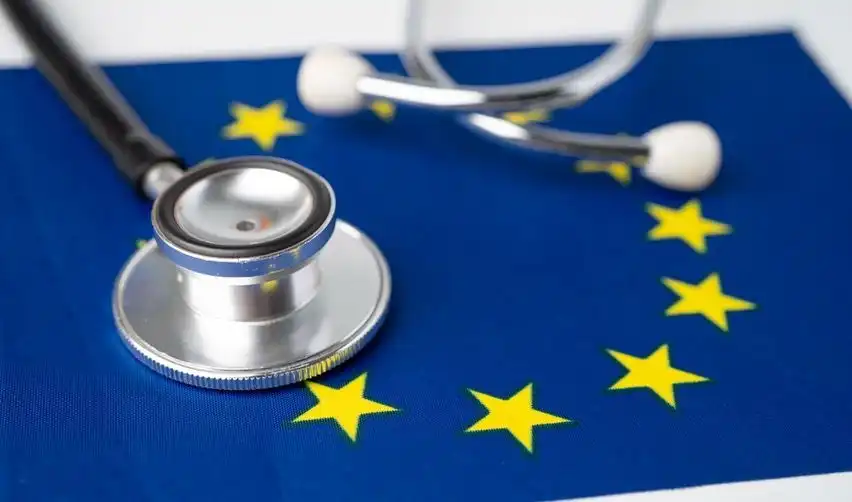Home>“Solidarity and Health”: Moving Towards a European Health Union
14.01.2022
“Solidarity and Health”: Moving Towards a European Health Union
Wednesday (12/1) at the Ministry for Solidarity and Health, Sciences Po’s Health Chair and the School of Public Affairs and Sciences Po Alumni hosted “Moving Towards a European Health Union?”, a conference dedicated to addressing current and future European health objectives. This multifaceted, multi-platform event assembled representatives from major European institutions, parliament members, and experts from both France and the European Union to analyse current EU initiatives, as well as to discuss the EU’s collective strategy on the Covid-19 pandemic and future health-related challenges.
Investing in Global Health
Among the participants was EU Health Commissioner Stella Kyriakides, who had encouraging words to share about the efforts that the EU has made since the beginning of the pandemic. From her mention of the three billion euros donated to COVAX (the global vaccine sharing mechanism), to the EU’s pharmaceutical strategy and cancer prevention plan or her reminder of the five-billion-euro investment in the EU4Health project to build stronger health systems, her statements highlighted the idea that the EU has invested not only in the interest of in EU member states, but in that of the world at large.
“Solidarity and Health: the Covid-19 pandemic has shown us that they go hand-in-hand,” affirmed Kyriakides, introducing an idea that would remain present throughout the discussion: namely, that European solidarity often takes the form of inter-nation cooperation. Indeed, as European Parliament Member and Representative of the European Commission Chrysoula Zacharopoulou stated, “The 2019 pandemic reminded us of our interconnectedness.”
Preparing for the Future
The question of preparedness for future crises was one in which all of the panelists took a keen interest. As French Deputy and co-author of the report on EU coordination of national measures to manage the health crisis Marietta Karamanli noted, “In 2021, we stressed the idea of how important it is to prepare for future crises.” She went on to state that there is a need to further strengthen the European health system and to ensure the solidity of European sovereignty which, as she stated, “protects us more than national sovereignty.”
Indeed, panel members agreed that the European project plays an essential role in making concrete progress for individual nation states and for the collectivity as a whole. Chrysoula Zacharopoulou pointed out the difficulties that Greece would have had in negotiating with pharmaceutical companies in the context of their economic crisis, and the rapidity of the vaccine rollout in Europe was further attributed to the strength of the European Union.
“Management, Access, Solidarity”… and “Belonging”
Yet how does one avoid pitfalls when it comes to implementation of policy? Mariette Karamanli cited three helpful practices, “management, access, solidarity”, that can help avoid a crisis of trust within the European Union. As she noted, the problem of unequal access to care between EU countries has proved to be a touchy subject throughout the rollout of the vaccines. Nevertheless, the collective action of the European Union was widely accepted as the best means of providing rapid, reliable care to patients across Europe—a trend that they hoped would continue and expand in the coming months with the French Presidency of the EU.
As Adrien Taquet, Secretary of State at the Solidarity and Health Ministry, noted in his concluding statements, within the slogan chosen by the French government for the French Presidency of the Union European: “Relaunch, Power, and Belonging”, universal access to health care falls within this idea of “belonging”. He went on to highlight the need for a continuing solidarity between member states, noting that a response such as that witnessed during the Covid-19 pandemic showed that the EU can stay strong in times of crisis.
New Channels of Reflection
Ultimately, the French Presidency for the EU has provided France—and the rest of the EU member states—with the opportunity to ask more expansive questions with greater stakes about the European Health system and the EU’s plans for its future. There was a consensus among the panelists that although the Covid-19 pandemic raised some intimidating challenges within the European Union, it also opened up new channels of reflection for inter-European cooperation on key issues and will allow member states to be better prepared for the future.
As one considers questions on management of the Covid-19 pandemic both within the European Union and beyond, it may be useful to keep in mind the words of Marietta Karamanli on identity in a global context, “We are all Greek; we are all French, because we are all European.” Indeed, finding new ways of cooperating to reach common goals beyond borders may prove to be a way forward in trying times. Until then, all we can do is prepare as best we can, through discussion, research, and the exchange of ideas.
The Sciences Po Editorial Team
Find out more
- About the event by watching it on YouTube (FR)
- About the Sciences Po School of Public Affairs
- Check out "The EU as a Global Actor" in a Divided World
